
Kód: 09134336
Western politeness principles reviewed in the Japanese notion of wakimae
Autor Ronny Muller
Seminar paper from the year 2014 in the subject Sociology - Communication, grade: 1,7, University of Erfurt, language: English, abstract: Considering the term polite seems to be straightforward in our way of thinking today. Howeve ... celý popis
- Jazyk:
 Angličtina
Angličtina - Vazba: Brožovaná
- Počet stran: 26
Nakladatelství: Grin Publishing, 2014
- Více informací o knize

Mohlo by se vám také líbit
-

Wayside Courtships
454 Kč -

Truth Behind a Happy Face
389 Kč -

Merchant of Venice
398 Kč -

Sisterhood of Jade
510 Kč -

Dark Tree Shining
252 Kč -

Flute Exam Pieces Grade 4 2017 2020 (Score & Part)
419 Kč -

Ford Convertibles 1952-1967
593 Kč
Dárkový poukaz: Radost zaručena
- Darujte poukaz v libovolné hodnotě a my se postaráme o zbytek.
- Poukaz se vztahuje na celou naši nabídku.
- Elektronický poukaz vytisknete z e-mailu a můžete ihned darovat.
- Platnost poukazu je 12 měsíců od data vystavení.
Více informací o knize Western politeness principles reviewed in the Japanese notion of wakimae
Nákupem získáte 100 bodů
 Anotace knihy
Anotace knihy
Seminar paper from the year 2014 in the subject Sociology - Communication, grade: 1,7, University of Erfurt, language: English, abstract: Considering the term polite seems to be straightforward in our way of thinking today. However, to get to the bottom of politeness is not as easy as it appears at a first glance. The topic by itself and the principles beyond politeness are quite complex. To determine a general definition of politeness is desperately sophisticated. Politeness includes a great amount of subareas and distinct characteristics among a broad range of countries and cultures.§§Given these points, Watts distinguished politeness research with being in combat with a many-headed hydra . Watts was on solid ground. Once you have separated one head of this hydra, all the more heads climb up instead. First of all, the spectator has to observe politeness research across-the-board. This fact by itself faces a huge and difficult challenge. Especially, if the observer keeps a close eye on issues related to politeness research. One of these subjects is the use of honorific forms in Western and Eastern societies. One conception beyond the usage of honorific forms was established by the Japanese sociolinguist Sashiko Ide (1989), who adjudicated the Japanese notion of wakimae as a conceptualization to define the usage of honorific forms across cultures.§§The aim of this paper is to challenge the applicability of wakimae with reference to Western politeness principles. The first head of the hydra that has to be controlled deals with Western politeness principles. A brief glimpse of politeness research is provided because it is essential for the understanding of politeness research and Ide s conception of wakimae. Current conceptions are predominantly based on these previous theories, labeled as first-wave approaches. Among first-wave approaches, the conception of Brown and Levinson was the most influential work in the field of politeness research. Correspondingly to first-wave approaches, a further head of the hydra appears in the field, the so called second-wave approach to politeness. After the clarification of first- and second-wave approaches, the conceptualization beyond East Asian and Japanese politeness enters the limelight. Another occurring and important head of the hydra is the notion of wakimae by itself. The end of this paper and the last head of the hydra are represented through a critical reflection of the Japanese notion of wakimae.
 Parametry knihy
Parametry knihy
Zařazení knihy Knihy v angličtině Reference, information & interdisciplinary subjects Interdisciplinary studies Communication studies
1004 Kč
- Plný název: Western politeness principles reviewed in the Japanese notion of wakimae
- Autor: Ronny Muller
- Jazyk:
 Angličtina
Angličtina - Vazba: Brožovaná
- Počet stran: 26
- EAN: 9783656841722
- ISBN: 3656841721
- ID: 09134336
- Nakladatelství: Grin Publishing
- Hmotnost: 45 g
- Rozměry: 210 × 148 × 2 mm
- Datum vydání: 01. December 2014
Oblíbené z jiného soudku
-

The Culture Map
381 Kč -

Nonviolent Communication: A Language of Life
445 Kč -

The Definitive Book of Body Language
306 Kč -

The Culture Map
541 Kč -

Fierce Conversations
410 Kč -

New Rules of Marketing & PR: How to Use Conten t Marketing, Podcasting, Social Media, AI, Live Vi deo, and Newsjacking to Reach Buyers Directly
555 Kč -

Messages
498 Kč -

Communication Book
306 Kč -

Nonviolent Commun Comp Workbook
444 Kč -

How to Read a Person Like a Book
496 Kč -

Revolutions in Communication
1150 Kč -

Introduction to Communication Studies
882 Kč -

Viral Marketing
717 Kč -

Impossible to Ignore: Creating Memorable Content to Influence Decisions
549 Kč -

Future of the Library
1770 Kč -

Athanasius Kircher
1415 Kč -

Social Media
1441 Kč -

Hand
458 Kč -

Creative Industries
1264 Kč -

Leadership Without Easy Answers
1313 Kč -

Master Switch
303 Kč -

Book Of Tells
357 Kč -

All About Language
894 Kč -

Communication Power
673 Kč -

Decoding Advertisements
532 Kč -

Ideology and Modern Culture - Critical Social Theory in the Era of Mass Communication
592 Kč -

Kittler and the Media
760 Kč -

Gutenberg Galaxy
1256 Kč -

Copycat Effect
483 Kč -

Qualitative Research Methods - Collecting Evidence Crafting Analysis, Communicating Impact 2e
1698 Kč -

Selections from Science and Sanity, Second Edition
1104 Kč -

On Dialogue
574 Kč -

Techniques of Close Reading
3935 Kč -

Democratising the Museum
2846 Kč -

Mediated Construction of Reality
650 Kč -

Body Language Bible
410 Kč -

Cognitive Psychology of Mass Communication
2511 Kč -

Communication Essentials For Dummies
265 Kč -

Public Service Media in Europe: A Comparative Approach
1626 Kč -

Interpersonal Communication Book, Global Edition
834 Kč -

Crowdsourcing
405 Kč -

Communication as Culture, Revised Edition
1701 Kč -

Social Media and Everyday Politics
751 Kč -

Health Writer's Handbook Second Edition
2459 Kč -

Walking Your Talk
605 Kč -

Becoming Digital
845 Kč -

Technology, Society and Inequality
1617 Kč -

Listening, Thinking, Being
1024 Kč -

Creating Intelligent Content with Lightweight DITA
1702 Kč
Osobní odběr Praha, Brno a 12903 dalších
Copyright ©2008-24 nejlevnejsi-knihy.cz Všechna práva vyhrazenaSoukromíCookies



 Vrácení do měsíce
Vrácení do měsíce 571 999 099 (8-15.30h)
571 999 099 (8-15.30h)